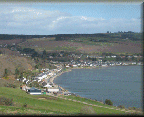In 1914, a basic dental treatment was introduced, but as parents had to pay 2s 6d for the cost of treatment only 15 to 20% were interested. Some teeth were so bad that nothing could be done. The advice of the MOH was to forget the very bad cases as they took up too much time to the disadvantage of other pupils.

In the early 1920s, only urgent cases were treated and fillings were done when the mouth was clean. According to a comment in the 1926 report, the teeth of entrants were deplorable, that many did not have one healthy tooth, and parents would not allow treatment because the children were so young. It was suggested that the state of the entrants’ teeth was possibly the result of artificial feeding in infancy and a faulty diet. Advice on cleaning teeth was given. “When no powder or paste is available, use soap or bicarbonate of soda!!
By 1947 there was still no organised system for dental inspections, but there was a big improvement at Dingwall with 80% of the boys and 5% of the girls not requiring treatment. Elsewhere there were still many with unhealthy gums, though supplies of Cod Liver Oil and Orange Juice had made an improvement.
The Ross-shire Branch of the British Red Cross gifted a mobile dental clinic, but it was 1951 before it was fully utilised. In 1954, 22 children were fitted with dentures, and in 1957, during dental examinations carried out in 28 schools, 90.29% required treatment. There was a need for a second mobile clinic as only one third of the schools were visited each year, and by 1958 the existing unit was mechanically unreliable. During 1960, plans were put forward to purchase a dental caravan trailer.
